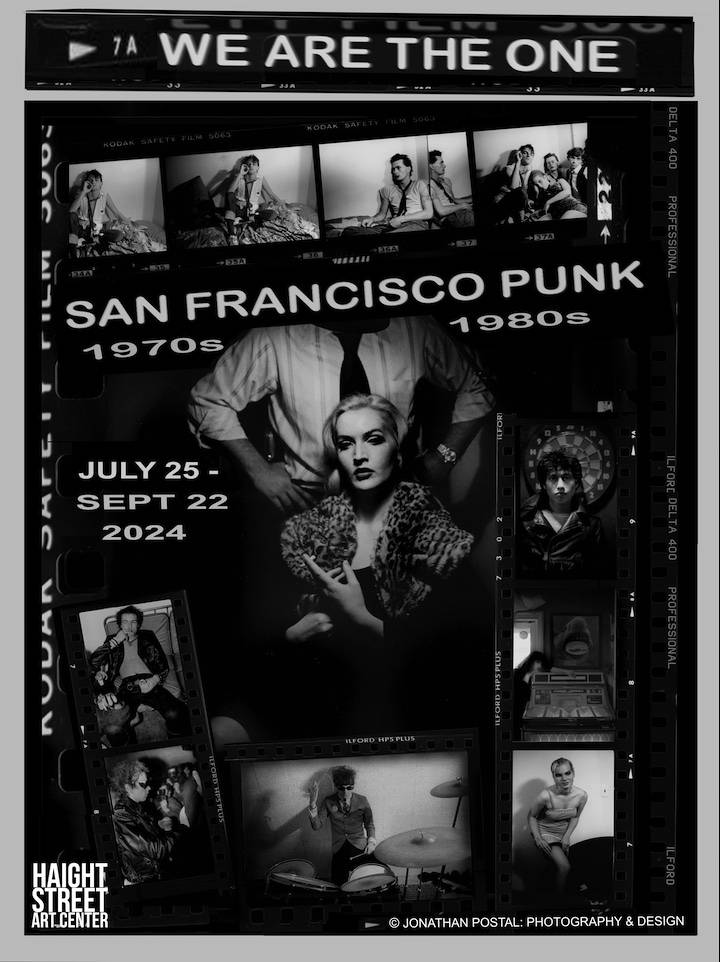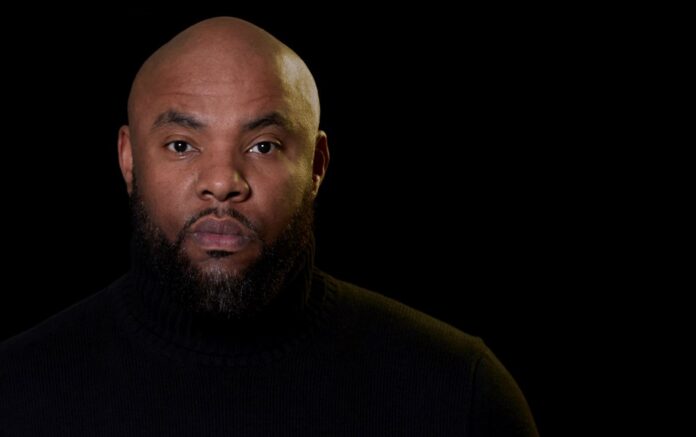It’s Under The Stars, babe: a quasi-weekly column that presents new music releases, upcoming shows, opinions, and other adjacent items. We keep moving with the changes and thinking outside the margins.
Rolling with history and reflecting on all the scenes this city has been home to.
NICK ANDRE & JOYO VELARDE, “BE FOREVER (CHIEF XCEL VENUS REMIX)” (BASTARD JAZZ)
San Francisco-based producer Nick Andre shared exclusively with 48hills his track “Be Forever,” featuring vocalist Joyo Velarde, remixed by Chief Xcel from Blackalicious. Andre and Velarde, Bay Area creatives, met while coordinating projects and were initially introduced by dear mutual friend Timothy Parker, also known as Gift Of Gab from Blackalicious, during the production of his album Finding Inspiration Somehow, which Andre produced.
“It’s very rare that [Chief Xcel] does remixes, so we were hyped when he offered to do this. It’s also the last remix for this project and a fitting way to bring it all home since this project came about when Gift Of Gab brought Joy over to record a hook on his record that I was producing shortly before he passed away,” stated Andre in a statement with us last week.
48hills is very honored to be the first to present this to the world.
Purchase the single here.

“WE ARE THE ONE: SAN FRANCISCO PUNK, 1970–1980” AT HAIGHT STREET ART CENTER
Suppose you are lucky enough to get Facetime with an Ess Eff OG. In that case, they will tell you firsthand, without hesitation, when this city was all about that punk—not indie jangle, not drum and bass nor hippie Dead-adjacent stuff—the epicenter was for sure Mabuhay Gardens on Broadway.
Way before Star Cleaners in The Mission held the punk belt in the ’90s, Bay Area punk and New Wave bands played there. Mabuhay was the touring stop for bands from beyond the zip code. Local faves The Adaptors, Avengers, Dead Kennedys, The Contractions, The Nuns, Crime, Dils, Sid Terror’s Undead, Pearl Harbor and the Explosions, The Mortals, new wave band Judy Garland, the Tubes, and Wall of Voodoo held court at the venue.
Through September 22, the Haight Street Art Center is presenting the exhibit We Are the One: San Francisco Punk, 1970s – 1980s, an exhibition of SF punk club posters and flyers, punk films, local punk music, and 150 striking photographs of artists such as Crime, the Avengers, the Ramones, Devo, Mutants, Blondie, the Nuns, John Cale, Lou Reed, Nico, the Dead Kennedys, Sleepers, Flipper, and many more. The show has been curated by SF punk expert, Michael Goldberg, a former Rolling Stone West Coast music editor who reported on the local scene during its heyday.
“I was attracted [in the late ‘70s] to the performers’ DIY spirit, the explosion of talent, energy and creativity,” says the Search & Destroy magazine photographer who called herself Kamera Zie, and whose photos are in the exhibition. “It was urgent, raw, aggressively feminist, and anti-music biz.”
To complement the exhibition, the Art Center will present a punk film night and panel on Friday, September 6. “San Francisco’s First and Only Rock ‘n’ Roll Movie: Crime 1978” directed by Jon Bastian will be screened, along with the rarely seen, unfinished, “In the Red,” a documentary shot in 1977 and 1978 by Liz Klein and Karen Merchant.
Grab more info here.
SPACE GHOST, DREAM TOOL (PEACE WORLD RECORDS)
If I had the power, I’d appoint the Oakland-based producer Space Ghost aka Sudi Wachspress to run the Muni lines for punctuality. ‘Cause he’s always on time.
This Bay Area staple in the dance music scene has launched a new label called Peace World Records.
“This is something I’ve been dreaming up for a while but this year finally felt like the right time to dive in,” Wachpress shared in a statement with Resident Advisor last week. “I’ve been chipping away at it all year and I’m finally ready to share my first record.”
Dream Tool, his four-track self-produced EP and label debut, makes consistency and quality control seem oh-so effortless.
As always, it’s a full night of feel-good, smell-good, and dance-better superior vibes, with the right emphasis on those loose knocking drums, barometrical climates, head-swaying piano lines, plus a little bass for your midnite face.
What a way to start an imprint.
Order it here.
STYLOLIVE, MXKA, MENEND, “RUSH” (SUCCO SOUNDS)
I read about once a month on music trade platforms that Latin and Latin music trends will continue to grow year after year. That’s great news and a very diverse topic, but my question, as with any music trend, is the music they’re talking about any good?
Succo Sounds is an indie record label based in Los Angeles that releases Global Latinx-blended hip-hop, afro, soul, and electronic dance music produced by Frederick Melendez aka Stylolive.
Somehow this production house has created a new form of pop music that serves its global audience, but at the same time, it’s accessible without becoming some watered-down drivel.
Take, for example, their new track “Rush”, a bilingual Latin dance-pop single from producer Stylolive, Blaxicana singer MXKA, and rising Spanish singer Menend.
It has these intimate chord changes, hushed vocals from MXKA, and Menend’s incandescent Spanish flows—both artists originally from The Bay—presenting this hybrid that speaks to the culture while leaving a door open for those interested in the celebration.
Grab the single here.
DOROTHY ASHBY, AFRO-HARPING NEW EXPANDED DELUXE EDITION (CADET)
Alice Coltrane was the second harpist I ever heard make otherworldly arrangements designed for that specific instrument. “Soul Vibrations,” the lionhearted militant jawn with that damn theremin at the top, from the paradigm-shifting project Afro-Harping, had Dorothy Ashby moving, strumming, and plucking through some Norman Whitfield dexterity: Its arrangement snaps something in your brain immediately.
Did I even know what a theremin was? Yeah.
I watched Captain Kirk after “Bowling For Dollars” as a kid. I knew what was up.
There’s a Sergio Leone vibe going hard—traveling over a dangerous terrain that you may not return from— before we even encounter Ashby’s sparkling line of detail.
Let’s not forget. That drum kick? Some rock-type stuff, ready to be looped up for some ’90s boom-bap glory.
Then Ashby hits, tinkling the strings, toying with us. Amidst tension violins in the background frame everything.
As I’m hearing this for the first time on a Sunday late-night FM terrestrial radio show on my trusty Panasonic RX-1740 boombox, I’m just thinking one thing: Mr. Jazzbo DJ (that was not the dude’s name btw) please either run the track back, and or read to me who that was.
This is my introduction to the jazz harp. I’m hooked. Primed and prepped. But not even knowing or ready for Alice Coltrane to take this even further.
Oh, I forgot to mention; that Dorothy Ashby was from Detroit.
Ashby transformed the harp from an orchestral use to a swinging mechanism in jazz. It’s like she fed that upright utensil the blues, and everything flipped. It started talking like a gentle dragon.
A deluxe version of Afro-Harping, which was recorded for Chess Records on the Cadet label, features eight bonus tracks, alternate takes from the surviving four-track session reels, and candid in-studio conversations between the musicians.
This artist’s influence on hip-hop, drum and bass, UK bass music, and future kinds of music we haven’t even created, remains beyond question.
Grab this up here and be forever inspired.
GETTING IT BACK: THE STORY OF CYMANDE
Generally, it’s the British who find and resurrect some American band or artist, most of the time Black or some other POC that the US forgot about. Still, in the case of the out-of-this-world ’70s British funk band Cymande, American Hip-Hop found and revered it, while shouting back over the Atlantic to the Brits, “Check your record bins, ya missed one.”
Cymande (pronounced Ceemande) had that girth and grandeur to be the British version of Earth Wind and Fire—horn section, jazz licks, the ability to combine genres into elongated compositions and when need be just blow folks away with breezy funk. They had all the tools, including headlining at the proving ground of all time, The Apollo Theater in Harlem, USA.
But back home, no UK TV station would put them on air. So the band broke up.
Then in the ’80s and ’90s hip-hop groups, De La to The Fugees, started sampling them. DJ Nicky Siano started playing them in the NY clubs. And the fascination about this Black-Brit band just kept growing through the younger generation.
This documentary features interviews with Tommy Guerrero, Laura Lee from Khruangbin, Maseo from De La Soul, Siano, Mark Ronson, Deb Grant, and others.
Do not miss Cymande this time.
More info on where to stream here.






